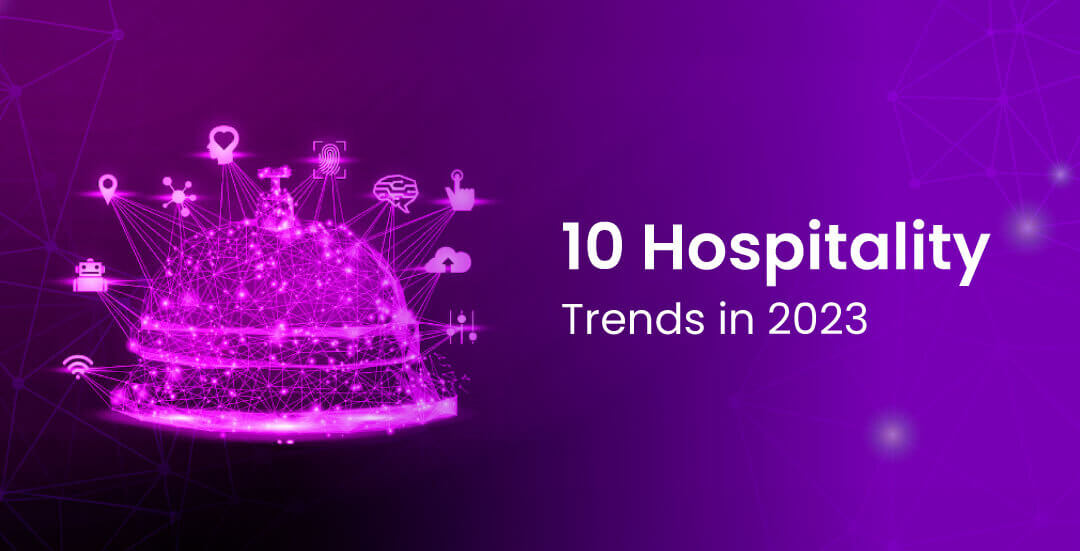Check out the top 10 technology trends of 2023 enhancing customer experience in the hospitality industry.
Cutting-edge tech solutions are making it easier for the hospitality industry to enhance customer experience. From contactless check-ins to AI-powered chatbots and virtual reality room tours, hotels and resorts are embracing a wide range of technological advancements to provide guests with a more seamless and enjoyable stay.
Here are 10 technology trends enhancing customer experience in the hospitality industry.
1. Contactless Check-In/Check-Out
The hospitality industry has witnessed a significant shift towards contactless check-in and check-out processes over the past few years. Mobile apps and self-service kiosks have gained prominence, allowing guests to skip the traditional front desk; therefore, reducing wait times and offering a more convenient and COVID-safe experience.
According to Statista, 63% of travelers prefer contactless check-in and check-out systems.
The pandemic accelerated the adoption of contactless technology, as it not only reduces wait times but also minimizes direct human interaction, contributing to a safer guest experience.
2. Keyless Entry
Keyless entry systems are revolutionizing the way guests access their accommodations. With the use of smartphones, guests can unlock their rooms, eliminating the need for physical key cards and providing an added layer of security.
A report by Hotel Tech Report states that keyless entry influences decisions of 49% of the travelers while choosing a hotel.
The advantages of keyless entry go beyond convenience. It enhances security, as digital keys can be easily deactivated and reactivated, reducing the risk of unauthorized access.
3. AI Chatbots for 24/7 Support
Artificial intelligence (AI) chatbots have become a hospitality industry staple, providing guests with 24/7 support. These virtual assistants are well-equipped to answer guest queries, fulfilling requests with personalized responses, ensuring a seamless and hassle-free experience.
73% of travelers prefer technology that reduces human interaction at hotels, as stated by Oracle.
Guests no longer need to wait for human assistance to get answers to their questions or fulfill their requests. AI chatbots can offer quick and tailored responses, ensuring a seamless stay.
4. Voice-Controlled Rooms for Convenience
By simply using their voice, smart devices have made it easier for guests to control different features in the room. Adjusting the room temperature, requesting housekeeping, or ordering room service is as easy as speaking a command. Even control the lights and entertainment systems through simple voice prompts.
Voice-controlled rooms reduce the need for physically interacting with switches or remote controls, making tasks more efficient and accessible, particularly for guests with disabilities.
5. Augmented Reality (AR) for Tours and Information
Augmented Reality (AR) provides interactive tours of the hotel and offers information about local attractions. Guests can enjoy an engaging, informative stay by pointing their smartphones or tablets at objects or signs.
AR-enhanced tours not only engage guests during their stay but also serve as a valuable marketing tool, enticing potential guests with immersive previews of their accommodations and local experiences. Hotels can showcase amenities and services in an engaging and interactive manner, influencing guests’ decision-making processes.
6. Virtual Reality (VR) Room Tours
Before guests even arrive at their hotel, they can embark on a virtual journey through their chosen accommodations. Virtual reality room tours provide an immersive experience, enabling potential guests to explore rooms and facilities from the comfort of their own homes. This technology offers a more accurate representation of what to expect during their stay, thus enhancing their decision-making and overall satisfaction.
VR room tours are especially beneficial for properties with unique or unconventional room layouts, as they allow guests to visualize the space and amenities more effectively than traditional 2D photos or descriptions.
7. IoT for Personalized Room Automation
The Internet of Things (IoT) has transformed guest rooms into smart spaces. IoT technology allows guests to control various aspects of their room, such as lighting, temperature, and entertainment systems, using mobile apps or voice commands. This level of personalization enables guests to create a comfortable and customized environment that caters to their specific preferences.
For instance, guests can dim the lights, set the room temperature, or stream their favorite music through the in-room speakers, all from their smartphone or voice-activated device. IoT also enables hotels to monitor room conditions and automatically adjust settings for energy efficiency, contributing to sustainability efforts.
8. Data-Backed Personalized Recommendations
Data analytics and machine learning have changed the way hotels cater to guests’ preferences. By analyzing guest data, hotels can suggest personalized recommendations for dining options, activities, and services. This tailored approach creates a customized experience for each guest, increasing their overall satisfaction and enhancing their stay.
9. Robotics for Enhanced Services
The integration of robotics into the hospitality industry has led to a new era of service delivery. Robots are taking on various roles, such as delivering room service, assisting with check-ins and check-outs, and even providing concierge services. These high-tech assistants streamline operations, reduce labor costs, and offer a unique and memorable experience for guests.
For guests, the novelty of being served by a robot adds an element of excitement to their stay. They can order room service or request additional amenities, and the robot will efficiently deliver their requests.
10. Data Analytics and Predictive Maintenance
Data analytics have a significant impact on maintaining a high level of guest satisfaction. Hotels use data to predict maintenance needs, ensuring that facilities are in top condition and that guests are not inconvenienced by unexpected issues. By monitoring equipment and infrastructure, hotels can schedule maintenance proactively, preventing potential disruptions to the guest experience.
Predictive maintenance is not only cost-effective but also enhances the overall experience for guests. It minimizes the likelihood of encountering out-of-service elevators, malfunctioning HVAC systems, or other inconveniences during their stay.
To Sum Up..
As the hospitality industry continues to evolve, we can expect even more innovation in the future. With technology constantly improving, the guest experience will become increasingly seamless, convenient, and personalized, ensuring that each stay is as memorable as possible.
Ready to enhance your guests’ experience?









0 Comments